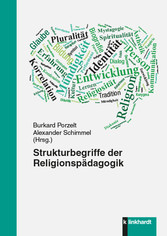Suchen und Finden
Service
Burkard PorzeltAlexander Schimmel(Hrsg.): Strukturbegriffe derReligionspädagogik
1
Impressum
4
Inhaltsverzeichnis
6
Einführung
8
A Fokus ‚Subjekt‘– anthropologische Strukturbegriffe der Religionspädagogik
12
A1 – Religiosität: Hans-Ferdinand Angel
12
1 Profil
12
2 Rezeption
14
3 Potenzial
15
Literatur
16
A2 – Spiritualität: Anton A. Bucher
17
1 Profil
17
2 Rezeption
19
3 Potenzial
21
Literatur
21
A3 – Entwicklung: Klaus Kießling
22
1 Profil
22
2 Rezeption
24
3 Potenzial
25
Literatur
27
A4 – Biografie: Annegret Reese-Schnitker
28
1 Profil
28
2 Rezeption
29
3 Potenzial
31
Literatur
33
A5 – Geschlecht: Angela Kaupp
34
1 Profil
34
2 Rezeption
35
3 Potenzial
38
Literatur
38
A6 – Identität: Viera Pirker
39
1 Profil
39
2 Rezeption
41
3 Potenzial
43
Literatur
43
A7 – Person: Gottfried Bitter
44
1 Profil
44
2 Rezeption
48
3 Potenzial
49
Literatur
50
A8 – Mündigkeit: Norbert Mette
50
1 Profil
50
2 Rezeption
53
3 Potenzial
54
Literatur
55
B Fokus ‚Begegnung‘ – relationale Strukturbegriffe der Religionspädagogik
56
B1 – Konvergenz(argumentation)Andreas Benk
56
1 Profil
56
2 Rezeption
57
3 Potenzial
58
Literatur
60
B2 – BildungRobert Schelander
61
1 Profil
61
2 Rezeption
63
3 Potenzial
65
Literatur
67
B3 – ErfahrungUlrich Kropa?
68
1 Profil
68
2 Rezeption
71
3 Potenzial
73
Literatur
74
B4 – KorrelationBurkard Porzelt
75
1 Profil
75
2 Rezeption
76
3 Potenzial
81
Literatur
81
B5 – HermeneutikFranz W. Niehl
82
1 Profil
82
2 Rezeption
84
3 Potenzial
85
Literatur
87
B6 – RezeptionJoachim Theis
88
1 Profil
88
2 Rezeption
90
3 Potenzial
92
B7 – DialogGeorg Langenhorst
93
1 Profil
94
2 Rezeption
95
3 Potenzial
96
Literatur
98
B8 – KommunikationMatthias Scharer
99
1 Profil
99
2 Rezeption
101
3 Potenzial
103
Literatur
104
C Fokus ‚Welt und Wirklichkeit‘ – kontextuelle Strukturbegriffe der Religionspädagogik
106
C1 – EmpirieGeorg Ritzer
106
1 Profil
106
2 Rezeption
107
3 Potenzial
108
Literatur
110
C2 – LebensweltMichael Wermke
111
1 Profil
111
2 Rezeption
113
3 Potenzial
115
Literatur
115
C3 – Kultur(geschichte)Harald Schwillus
116
1 Profil
116
2 Rezeption
117
3 Potenzial
119
Literatur
120
C4 – PluralitätGuido Meyer
121
1 Profil
121
2 Rezeption
122
3 Potenzial
125
Literatur
126
C5 – IdeologiekritikRudolf Englert
127
1 Profil
127
2 Rezeption
129
3 Potenzial
130
Literatur
132
C6 – ProblemorientierungDavid Käbisch
133
1 Profil
133
2 Rezeption
135
3 Potenzial
136
Literatur
137
D Fokus ‚Christlichkeit‘ – theologische Strukturbegriffe der Religionspädagogik
140
D1 – Glaube(n)Alexander Schimmel
140
1 Profil
140
2 Rezeption
142
3 Potenzial
145
Literatur
147
D2 – MystagogieMirjam Schambeck
148
1 Profil
148
2 Rezeption
148
3 Potenzial
151
Literatur
153
D3 – Katechese (als Grundform religiösen Lernens)Monika Jakobs
153
1 Profil
153
2 Rezeption
155
3 Potenzial
158
D4 – Kerygma(tik)Wolfgang Pauly
159
1 Profil
159
2 Rezeption
162
3 Potenzial
163
Literatur
164
D5 – EvangelisierungThomas Schreijäck
165
1 Profil
165
2 Rezeption
167
3 Potenzial
168
Literatur
169
D6 – DiakonieMartina Blasberg-Kuhnke
170
1 Profil
170
2 Rezeption
172
3 Potenzial
174
Literatur
175
D7 – Konfession(alität)Monika Tautz
176
1 Profil
176
2 Rezeption
177
3 Potenzial
180
Literatur
180
D8 – ÖkumeneMonika Scheidler
181
1 Profil
181
2 Rezeption
183
3 Potenzial
184
Literatur
185
E Fokus ‚Aspekte des Religiösen‘ – dimensionierende Strukturbegriffe der Religionspädagogik
188
E1 – ReligionBernd Schröder
188
1 Profil
188
2 Rezeption
189
3 Potenzial
194
Literatur
195
E2 – TraditionChristian Cebulj
195
1 Profil
196
2 Rezeption
198
3 Potenzial
200
Literatur
200
E3 – SymbolSilvia Arzt
201
1 Profil
201
2 Rezeption
202
3 Potenzial
205
Literatur
206
E4 – ÄsthetikStefan Altmeyer
206
1 Profil
207
2 Rezeption
209
3 Potenzial
210
Literatur
211
E5 – PerformanzMichael Domsgen
212
1 Profil
212
2 Rezeption
213
3 Potenzial
215
Literatur
217
E6 – EthikBernhard Grümme
218
1 Profil
218
2 Rezeption
219
3 Potenzial
221
Literatur
222
F Fokus ‚Lernermöglichung‘ – didaktische Strukturbegriffe der Religionspädagogik
224
F1 – LernenHans Mendl
224
1 Profil
224
2 Rezeption
228
3 Potenzial
230
Literatur
231
F2 – DidaktikKlaus König
232
1 Profil
232
2 Rezeption
233
3 Potenzial
237
Literatur
239
F3 – KompetenzLothar Kuld
239
1 Profil
239
2 Rezeption
240
3 Potenzial
243
Literatur
243
F4 – CurriculumGeorg Hilger
245
1 Profil
245
2 Rezeption
247
3 Potenzial
249
Literatur
250
F5 – ElementarisierungFranz-Josef Bäumer
251
1 Profil
251
2 Rezeption
252
3 Potenzial
253
Literatur
255
F6 – ReligionskundeHans-Georg Ziebertz
256
1 Profil
256
2 Rezeption
258
3 Potenzial
260
Literatur
260
Sachregister
262
Personenregister
264
Autorenverzeichnis
271
Rückumschlag
274
Alle Preise verstehen sich inklusive der gesetzlichen MwSt.








